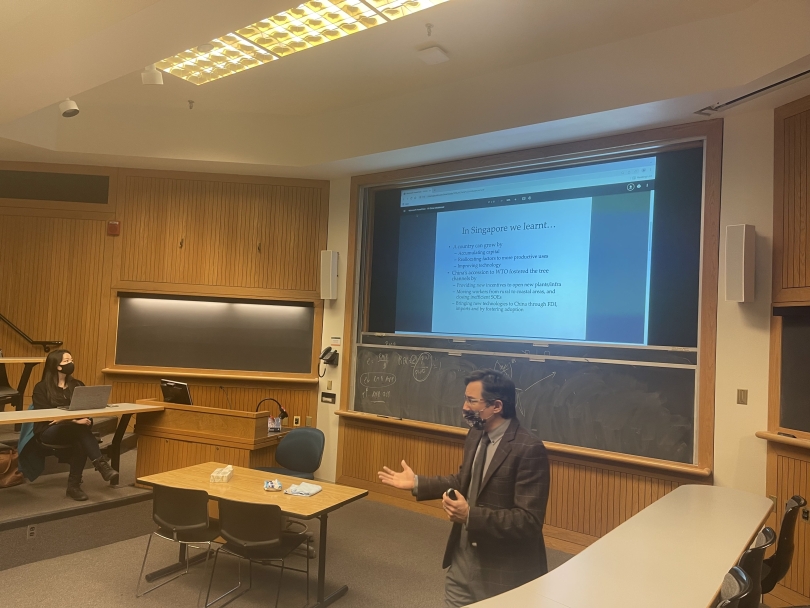
Dartmouth's Economics Major Debunked
Ever turn on the news and wonder why inflation can be so persistent? Or perhaps how exactly countries with a comparative advantage benefit from international trade? I'm four courses away from completing my Economics major—so not an expert yet—but here are my tips to succeed and figure out if Economics is right for you.
In 2019, when I received my Early Decision acceptance letter to Dartmouth, I knew I wanted to explore the social sciences. However, I was not 100% confident I was going to major in Economics and knew I needed to take a class to figure out if the major was something I wanted to pursue. During my freshman fall, I enrolled in ECON 1: The Price System: Analysis, Problems, and Policies to explore the department, one of three prerequisites for Dartmouth's Economics major. While I received the MATH 3 (ECON 3) equivalent from my AP Calculus AB exam, I needed to take MATH 10, ECON 10, GOVT 10, SOCY 10, or an equivalent statistics course to earn my statistics credit for the major. I chose MATH 10 because I wanted to try out a class in Dartmouth's Math department!
The joy of studying Economics is gaining the quantitative skills that you can apply to modeling real-world topics such as monetary policy, international trade, the optimal provision of public goods, and the utility gained from a cash transfer versus in-kind benefits. Microeconomics examines how firms and individuals make decisions (more intersections with math and quantitative topics), while macroeconomics studies the economy as a whole (more intersections with government and public policy).

Now, onto my tips for the major!
Tip #1: You don't need to take classes by order of their number, although the higher number classes tend to be more specific and topics-based than the lower ones. So far, I've taken ECON 1: The Price System, ECON 21: Microeconomics ECON 22: Macroeconomics, ECON 39: International Trade, ECON 28: Economics of the Public Sector (through my University College London exchange), and ECON 00: Economic History (through my University College London exchange). ECON 20, 21, and 22 (Econometrics, Microeconomics, and Macroeconomics) are often regarded as some of the hardest classes in the major. These three core classes help students build strong foundational skills for the upper level courses. I would recommend taking ECON 21 soon after finishing ECON 1 so microeconomics is still fresh in your mind.
Tip #2: Pick a track that you are interested in, and don't worry about picking the "wrong" track as an underclassman because you don't officially decide until your senior year when you enroll in your culminating experience. During your senior year, you will enroll in your track's senior seminar where you will produce your own empirical research paper. I am planning to complete either the Development track (the "4s") or the Public track (the "8s") depending on which courses are offered during my senior year and how I'm feeling then.
Tip #3: Take advantage of Dartmouth's more intimate class sizes. Since Dartmouth does not have a graduate program for Economics, undergraduates are front and center in many research opportunities. Dartmouth's smaller class sizes make it easy to stay back for a few minutes after class to ask if your professor has any opportunities to partake in research, review tough problems, drop by office hours with questions, or get to know your professor better. I even took my Microeconomics professor Dr. Petre out to lunch at Pine, a nice restaurant across the Green located at the Hanover Inn, during sophomore summer with my friend through Dartmouth's Take a Faculty Member to Lunch program sponsored by the Undergraduate Deans Office and Student Assembly.
Tip #4: If you are very interested in Economics, Dartmouth offers opportunities to enrich your knowledge besides the standard major. I'd recommend looking into the Dartmouth Economic Research Scholars (DERS) program (where you are matched with a faculty member to assist in research), ECON 78: Fed Challenge (which sends students to an annual Fed Challenge Team competition in Boston), the Honors Program (where you can write a thesis in Economics), and three exchange programs (where you can study abroad in Europe to Oxford University, Bocconi University, and University College London). I recently wrapped up my fall study abroad program at University College London, where I got to earn credits for my Economics major and spend a term making new friends and memories in another continent.
Hope this post helped explain some of Economics at Dartmouth, and have a wonderful winter!


















